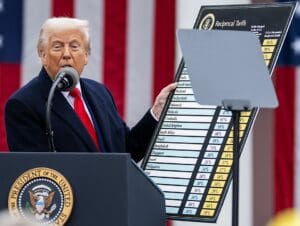The economic crisis caused by the coronavirus pandemic poses a triple challenge for tax policy in the United States. Lawmakers are tasked with crafting a policy response that will accelerate the economic recovery, reduce the mounting deficit, and protect the most vulnerable.
To assist lawmakers in navigating the challenge, and to help the American public understand the tax changes being proposed, the Tax Foundation’s Center for Federal Tax Policy modeled how 70 potential changes to the tax code would affect the U.S. economy, distribution of the tax burden, and federal revenue.
In tax policy there is an ever-present trade-off among how much revenue a tax will raise, who bears the burden of a tax, and what impact a tax will have on economic growth. Armed with the information in our new book, Options for Reforming America’s Tax Code 2.0, policymakers can debate the relative merits and trade-offs of each option to improve the tax code in a post-pandemic world.

Oregon Considers Decoupling from the Federal Tax Code
The proposed changes to federal tax code conformity in Oregon are a good example of a change that could significantly reshape the state’s tax code in the future, despite being framed as temporary technical adjustments.
4 min read
South Carolina Lawmakers Have Other Options for Achieving a Flat Income Tax
Lawmakers are right to enact a single-rate individual income tax. However, lawmakers should consider the full effects of the reform, ensuring that relief is not financed by shifting the tax burden to lower-income individuals and families.
4 min read
A Carbon Tax on Cigarettes in Washington State?
Among the many other tax proposals being considered in Washington this year, policymakers have proposed separate bills that would impose a carbon tax on cigarettes and implement a state-wide flavor ban on tobacco products.
3 min read
Trump’s Reciprocal Tariff Calculations Are Nonsense, Will Punish Mutually Beneficial Trade
Despite characterizing the tariffs as “reciprocal,” the White House didn’t actually measure tariffs, currency manipulation, or trade barrier policies employed by other countries. Instead, it drew its estimates from something else entirely: bilateral trade deficits in goods.
7 min read
How Will President Trump’s Tariffs Affect the Value of the Dollar?
President Trump has announced that new tariffs will go into effect on April 2, following several weeks of threats. These new tariffs are likely to be broader in scope than the limited ones implemented thus far. So who is likely to pay for them?
7 min read
A New State Payroll Tax Could Drive Jobs out of Washington
With a wealth tax, property tax increases, and this new payroll tax on the agenda, Washington lawmakers have reason to fear that many employers could be looking for the exits.
5 min read
Discrimination vs. Neutrality: A Case Study in the Middle of a Trade War
Policymakers should aim for neutral tax policies that support stable revenues like VATs and avoid inviting trade conflicts with discriminatory and economically harmful policies like DSTs.
6 min read
Indiana Mulls Local Income and Property Tax Reforms
This legislative session, local taxes are a major topic of debate in Indiana. Although the state’s property tax system is already nationally competitive, dramatic increases in assessed values have created discontent in recent years.
8 min read
Effects of the Federal Constitutional Court’s Judgment on Germany’s Solidarity Surtax
Surtaxes such as Germany’s solidarity surtax run counter to the principles of simplicity and transparency of the tax system because they impose an additional layer of tax on taxpayers and create a more complex tax structure that often obscures the actual tax burden.
4 min read
Maryland Shouldn’t Mandate Worldwide Combined Reporting Through the Backdoor
Maryland’s proposed budget has garnered headlines for many reasons, but another momentous change is flying under the radar: backdoor adoption of potentially mandatory worldwide combined reporting.
6 min read